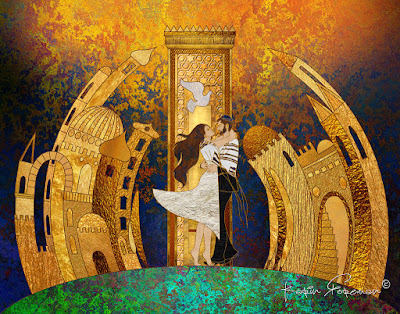I am exhausted form rejoicing in the Torah. It is pleasant, was pleasant, but the High Holidays have taken a great deal out of me, perhaps out of many of us. They are, after all, an offering, and we offer what we have to enter int othe mystery of rejoicing. For me in the Alchymical Rite, this time has been a passage through the three degrees. Every song, every prayer, every silence was an offering, and an offering will cost something, will change you. The work that was not done so that we could work at prayer. The work that was not done so that we could worship and bind ourselves together. Those things we did not set before ourselves so that we could se this moment before us, all was an offering
I feel hollowed out now, truly tired but in need of writing. I am like a calm sea, but there is stuff going on underneath and writing begins to sort it out. I had all manner of strange dreams and I felt like, coming out of them, it was a necessary thing for me to go back to that country, the dream country had missed me. There are works I would do, but that I am too tired to attempt. Ideas in my head that will not form because I have given myself to something else.
Of old, the prayer for rain was withheld for fifteen days to allow pilgrims in Babylon to get home. Babylon and Jerusalem were the nexus points of ancient Judaism. The ancient Jews work their prayers and their prayers and the rituals like magic, for thye were magic. All this means was they expected things to happen. They prayers to God addressed in the Temple were not idle. So there was no symbolic prayer for rain with the understanding that God might not fulfill it, or he would see past their symbolism and not make it rain. They simply didn ot pray for what they did not desire.
The psalms and the stories are full of blood and vengeance because they were a soul book. They did not bring their best face to God, but the only face they had. I sit here, watching the last half of the Ten Commandments. What a strange God. He wasn't even there most of them time ,and then he finally shows up halfway through full of fear and punishment, blood and fire. Even his deliverance is fearful. There have been so many stories in the last days, the book of Jonah, the beginning of the world, the end of the Torah, the stories I have taken unto myself, Daniel, Moses, a kaleidoscope of stories I thought I didn't care much for anymore. The chanted psalms of deliverance which are better and more heartfelt when I do not understand them, and me dealing with things I had put away long ago, looking again and again at memories I had put away.
We pledge ourselves to finishing the things we started and starting the new life as well. At Simchat Torah we end the Torah and begin it again in a single breath.In doing what I have to do I make as many enemies as friends and help the bad and the would be good. And I read stories of this strange God with blood on his hands. Righteousness seems to be a thing of doing, not what is kind or lovely or light or approved, but doing what one must.

What does this link to Torah which we celebrated yesterday, but in one way, throughout all of the high holidays mean? I watched the end of the Ten Commandments, where Moses goes up and God's wobbly finger traces, with fire, ten banal commandments. At the end, Moses hands over a case with the five scroslls of the Penteteuch to Joshua and heads up to the top of Mount Nebo, but this is not what joy in the Torah or the reception of the Torah celebrated at Shavuot is about, or at least, these are only ways of talking about the truth we have a hard time getting to. Who is dancing over ten commandments, or who is celebrating the five scrolls of the law especially when they become awfully, awfully dull midway through Exodus? No, the rabbis understood the Torah was what Buddhist call the damma, the way of life, the way beyond the way, the words pointing to something deeper, the commandments pointing to a bond, the written Torah and the Oral Torah pointing to a heavenly one, and internal one, a dance, yes, even an argument. As the old man says in Karl Freidnman;s The Shovel and the Loom, Judaism is the tension between the skeptical question and the absolute devotion, well that's a bit of a paraphrase. Shemini Atzeret calls us again to the long, long love affair with all of its ups and downs.












